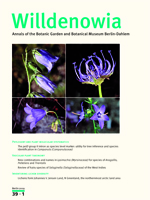55 species are reported new to Greece, 43 new to the Greek mainland and 172 new to one or more of the Greek provinces. A considerable proportion of the newly reported lichens are hitherto known to have a Central European distribution. For these lichens the new records represent significant range extensions.
References
T. Ahti
1977:
Cladonia Wigg. subgen. Cladina (Nyl.) Leight. — Pp. 45–49 in:
J. Poelt
& A. Vězda
, Bestimmungsschlüssel europäischer Flechten. Ergänzungsheft I. — Vaduz. Google Scholar
R. Arroyo
, E. Seriña
& E. Manrique
1995:
Ramalina elegans (Lichenes, Ramalinaceae) a taxon which has been mistaken for Ramalina calicaris and R. fastigiata in the Iberian peninsula. — Cryptog. Bot. 5: 22–27. Google Scholar
M. Cengia-Sambo
1924: Licheni di Rodi raccolti dal Prof. Adriano Fiori nell' Agosto 1923. — Bull. Soc. Bot. Ital. 1924: 123–125. Google Scholar
S. N. Christensen
1989: The lichen flora on Ulmus in a N Greek mountain village with an introduction to the literature on Greek lichens. — Graphis Scripta 2: 107–113. Google Scholar
S. N. Christensen
1994a: Lichens associated with Pinus nigra on Mt Trapezitsa, Epirus, NW Greece. — Acta Bot. Fenn. 150: 11–20. Google Scholar
S. N. Christensen
1994b: Lichens on plane trees in two Greek localities with contrasting environments. — Bot. Chron. 11: 31–39. Google Scholar
S. N. Christensen
2007: Lichens of Cupressus sempervirens on the Aegean islands of Kriti and Kos, Greece. — Willdenowia 37: 577–585. [ CrossRef] Google Scholar
S. N. Christensen
& S. Svane
2007: Contribution to the knowledge of the lichen flora of Crete (Kriti), Greece. — Willdenowia 37: 587–593. [ CrossRef] Google Scholar
G. Clauzade
& C. Roux
1985: Likenoj de Okcidenta Europo. Ilustrita determinlibro. — Bull. Soc. Bot. Centre-Ouest, ser. 2, Numéro Spécial: 7–1985:1–893. Google Scholar
A. Crespo
, A. Arguello
, H. T. Lumbsch
, X. Llimona
& T. Tønsberg
2006: A new species of Lepraria (Lecanorales: Stereocaulaceae) from the Canary Islands and the typification of Lepraria isidiata. — Lichenologist 38: 213–221. [ CrossRef] Google Scholar
S. Dafis
1975: Vegetationsgliederung Griechenlands. — Veröff. Geobot. Inst. ETH, Stiftung Rübel, Zürich, 55: 23–36. Google Scholar
T. L. Esslinger
1973: Nomenclatural notes on some members of Parmelia section Melanoparmelia. — Bryologist 76: 306–309. [ CrossRef] Google Scholar
L. Fröberg
1997: Variation in the Lecanora dispersa group in South Sweden. — Symb. Bot. Upsal. 32: 29–34. Google Scholar
M. Grube
, L. Lindblom
& H. Mayrhofer
2001: Contributions to the lichen flora of Crete: a compilation of references and some new records. — Studia Geobot. 20: 41–59. Google Scholar
D. L. Hawksworth
, O. Blanco
, P. K. Divakar
, T. Ahti
& A. Crespo
2008: A first checklist of parmelioid and similar lichens in Europe and some adjacent territories, adopting revised generic circumscriptions and with indications of species distribution. — Lichenologist 40: 1–21. [ CrossRef] Google Scholar
I. Horvat
, V. Glavač
& H. Ellenberg
1974: Vegetation Südosteuropas. — Stuttgart. Google Scholar
C. Leuckert
, H. Kümmerling
& V. Wirth
1995: Chemotaxonomy of Lepraria Ach. and Leproloma Nyl. ex Crombie, with particular reference to Central Europe. — Biblioth. Lichenol. 58: 245–259. Google Scholar
A. H. Magnusson
1950: On some species of Blastema and Caloplaca with black apothecia. — Bot. Not. 1950: 369–386. Google Scholar
M. Matzer
& H. Mayrhofer
1994: The saxicolous Rinodina teichophila and three closely related species from the southern hemisphere (Physciaceae, lichenized Ascomycetes). — Acta Bot. Fenn. 150: 109– 120. Google Scholar
H. Mayrhofer
1984: Die saxicolen Arten der Flechtengattungen Rinodina und Rinodinella in der alten Welt. — J. Hattori Bot. Lab. 55: 327–493. Google Scholar
J. Poelt
& C. Leuckert
1995: Die Arten der Lecanora dispersa-Gruppe (Lichenes, Lecanoraceae) auf kalkreichen Gesteinen im Bereich der Ostalpen — Eine Vorstudie. — Biblioth. Lichenol. 58: 289–333. Google Scholar
J. Poelt
& W. Petutschnig
1992:
Xanthoria candelaria und ähnliche Arten in Europa. — Herzogia 9: 103– 114. Google Scholar
J. Poelt
& A. Vězda
1977: Bestimmungsschlüssel europäischer Flechten. Ergänzungsheft I. — Vaduz. Google Scholar
J. Poelt
& A. Vězda
1981: Bestimmungsschlüssel europäischer Flechten. Ergänzungsheft II. — Vaduz. Google Scholar
O. Polunin
1980: Flowers of Greece and the Balkans, a field guide. — Oxford, etc. Google Scholar
A. Schuler
2004: Charakterarten mitteleuropäischer Pflanzengesellschaften an ihrer Verbreitungsgrenze in Griechenland. — Bot. Chron. 17: 1–168. Google Scholar
L. Śliwa
2007: A revision of the Lecanora dispersa complex in North America. — Polish Bot. J. 52: 1–70. Google Scholar
U. Søchting
, I. Kärnefelt
& S. Kondratyuk
2002: Revision of Xanthomendoza (Teloschistaceae, Lecanorales) based on morphology, anatomy, secondary metabolites and molecular data. — Mitt. Inst. Allg. Bot. Hamburg 30–32: 225–240. Google Scholar
T. Spribille
, M. Schultz
, O. Breuss
& E. Bergmeier
2006: Notes on the lichens and lichenicolous fungi of western Crete (Greece). — Herzogia 19: 125–148. Google Scholar
Ö. Szatala
1943:
Lichenes. — Denkschr. Akad. Wiss. Wien, Math.-Nat. Kl. 105(1): 16–58. Google Scholar
K. G. Theodoropoulos
1991: [Classification of vegetation in Taxiarchis University Forest, Chalkidiki] (in Greek). — Sci. Ann. Depart. Forest. Nat. Environm. Thessaloniki 22(18). Google Scholar
O. Vitikainen
1994: Taxonomic revision of Peltigera (lichenized Ascomycotina) in Europe. — Acta Bot. Fenn. 152: 1–96. Google Scholar
L. Zedda
2000: The lichen genera Lepraria and Leproloma in Sardinia (Italy). — Cryptog. Mycol. 21: 249–267. [ CrossRef] Google Scholar





